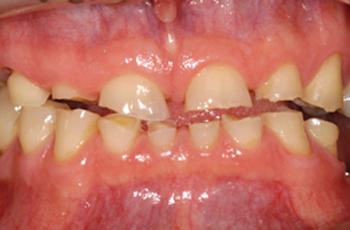Bruxism, also known as teeth grinding, is a rather common condition among both children and adults.
Although many of the people who suffer from it are unaware of their condition, it should be treated as soon as possible as it can cause serious damage to their teeth and jaw.
Sufferers often grind their teeth in their sleep – this puts pressure on facial muscles and can result in jaw pain, headaches, earaches and damaged teeth.
If the condition remains untreated for a long time, teeth may get chipped or be reduced and gums may start receding, leading to tooth loss.
Grinding Wears Down Your Teeth
There may be an underlying cause that requires attention. Teeth may be wearing down by an unconscious habit of tooth grinding. Many people who grind their teeth don’t even know that they are doing it and often only realise when their partner explains that they have been grinding their teeth at night making a noise. Whilst a lot of teeth clenching occurs during the day, most teeth grinding occurs at night when it is out of your control. So what to do?
Firstly you need to recognize that you are a teeth grinder. There are various telltale signs that elude to this. The most common one being the grinding noise. However, there are other more serious effects.
Telling signs of Teeth Grinders Include:
- Worn down teeth
- Cracked teeth
- Breaking fillings
- Head and neck pain
- Jaw joint symptoms
- Regular headaches
- Sensitive teeth
- Sore facial muscle
- Clicking and popping of the jaw
- Anxiety
- Insomnia
Judging whether somebody has bruxism can be hard without a dental check-up for proof.
Dentists can spot the signs of bruxism, including tiny fractures in the tooth enamel and badly worn teeth. Even though the condition is very hard to cure in adults, sufferers should still seek treatment to minimise the damage to their teeth and jaw.
One of the most effective solutions is having a custom occlusal guard made, to be worn whilst asleep. It protects the surface of the teeth and reduces the pressure on the jaw tissue and bone.
However, it is possible to treat bruxism by altering one’s bite, too. If there are specific high points in the upper and lower teeth, or if there are teeth that do not fit together well, reconstructive treatment may be recommended, World Dental reports.
Causes of Teeth Grinding (or Bruxism)
The scientific term for teeth grinding is “Bruxism”.
Some people grind because they have what dentists call “interferences” when they are chewing. These interferences prevent smooth operating of the upper teeth with the lower teeth and so diverts the jaw into a different action.
In order to correct this situation, you need to have a “Bite Analysis” done. At The Perfect Smile Studios, Dentist Dr. Doshi uses advanced digital technology to help analyse the teeth in your mouth that are under excessive pressure. He can often make simple adjustments to your bite and easily correct these interferences.
However, the most common cause of teeth grinding is stress! Teeth grinding is a central nervous system phenomenon and so is our abilities to cope with stress. However, positive stress management can be enormously beneficial to teeth grinders.
Also, foods and drinks that are acidic in nature can make a teeth grinder’s situation worse. This is because the acid erodes away the hard protective enamel covering leaving the core of dentine exposed and vulnerable to decay.
How teeth grinding affects your dental work
At The Perfect Smile Studios, we will analyse your teeth to assess for teeth grinding problems. We look at all the possible indicators for this situation. Once we have derived some conclusions and diagnosis as to the extent of the problem, we then look at what your exact requirements are.
Dr. Doshi often integrates many protective features into his smile makeover and treatment plans. This can include protective new bites being established, protective material bonded onto weakened surfaces, protective crowns on very weak and heavily filled teeth and protective night teeth guards.
If you feel that you are a teeth grinder, then we can help. Call our studios for a free consultation so that we can help provide a way forward and help prevent further deterioration of your teeth.
Similar Posts
GUM DISEASE: ORAL TREATMENTS & DENTAL HEALTH › CARING FOR TEETH
Gum disease is a common cause of tooth loss in adult patients. At our practices, our prime concern is for our patients to have a healthy mouth with good levels of oral hygiene.
Detection of Gum Disease Gum problems are mostly painless, and patients are often not aware that gum disease is present. The main causes of gum disease are plaque and tartar deposits around the teeth and gums.
WHAT ARE RESTORATIVE DENTAL SERVICES?
Restorative dental work These are any treatments that are used to restore teeth and gums back to health. It often involves replacing or rebuilding teeth or their surrounding support structure back to its original or even better appearance.
See Bupa Dental Cover for Private and NHS Patients: Is It Right for You? Restorative treatments are not only aimed at cosmetics though, they also serve the purpose of making those teeth structurally supported and protected.
